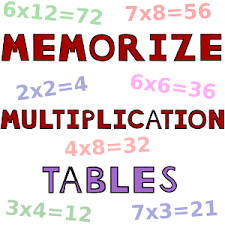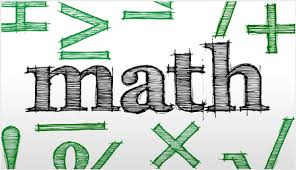by Chuck Summers | Oct 6, 2016 | Math
 Should Students Memorize Multiplication Facts?
Should Students Memorize Multiplication Facts?
I have been struck recently on how many students (and adults) struggle with multiplication. This skill is so basic to math that lack of mastery makes progress in math very difficult, at best. I am not even concerned so much about multiplication of positive and negative numbers as knowing what 6×7 is, for example, because it is hindering many students in higher math.
I don’t believe that a person needs to know “what” multiplication is, for example 6×7 is 6 groups of 7. The multiplication facts are more like the basic phonemes or words of math. When you learn to speak your native language as a child, you don’t really understand the meaning of the words, you are learning and mimicking the sounds and patterns.
As a young pre-teen, I was determined to learn the Morse code in order to become a Ham Radio Operator. I spent time memorizing the code, like a is dot-dash, b is dash-dot-dot-dot, and so forth. I found that I was limited in the speed I could decode the sounds because of the way I was learning the code. I would hear dot-dash and count the dots and dashes.
Unfortunately the requirement for the General Class license was 13 words a minutes, well beyond the mere 5 words a minute I could muster by counting the dots and dashes. My breakthrough came when an older Ham told me, “you can’t just count the dots and dashes, you have to hear the patterns”.
So I started listening for the patterns, so that a was not simply dot-dash, it was a short beep followed by a longer beep. In listening for the patterns I was able to boost my speed up to 18 words per minute, well above the required speed. After a while, you tend to hear whole words and ending as a single unit, so you aren’t just decoding single letters but whole words, much like we learn to hear a language.
So what does all this have to do with learning to multiply? I propose that it is easier to learn the multiplication facts by seeing the patterns and learning the patterns without trying to understand what they mean. That will become clear as you use them. Young children are like sponges and have no trouble learning repetitious and sometime annoying things. Why not teach them the multiplication tables? In the past, memorization devices like catechisms were used to teach children profound truths that they didn’t understand but became part of their knowledge and understanding when they were older.
For older children, repetition is the key. Use all the senses: writing the facts, seeing the facts, hearing the facts spoken, speaking the facts (or singing the facts?). The more senses can be brought into the memorization process, the better.
It is never too late, even for adults, as the human brain is amazingly elastic. If you know what kind of learner you are (visual, audial, tactile) then use that to your advantage. The nice thing about memorization, especially for adults is that it expands the use you have of your mind. So make a point to learn and master the multiplication tables. You will be glad you did.
by Tyler Mathena | Oct 6, 2016 | Math, Teaching and Learning, Testing
 When Should I Take the SAT or ACT?
When Should I Take the SAT or ACT?
By: Tyler Mathena
The SAT and ACT are daunting for many students. The scores on these two tests (or just one) can determine what colleges you can attend, what scholarships you can apply for, and whether or not you get into the honors program. All of these have the potential to impact your life, for better or worse, so it is best to be well-informed and prepared.
Everyone knows the magnitude of these tests, and a Google search for test taking tips returns over 18 million results. Most people know how, why, and where to take the test, but it is rarely discussed WHEN students should take it.
The reading and grammar concepts on both tests are mostly covered before high school, it is just a matter of recalling all of the rules and vocabulary. The math section, on the other hand, contains information that students learn in high school classes. After taking Geometry and Algebra, you should have learned most of the content, but do not be discouraged if there are questions you can not figure out! Some of these questions require a different approach or way of thinking, which is often where the strategy comes into play.
Even if you have not done all of the math courses to get a perfect score on the math section of the tests, you should still take it. I would recommend taking both tests at least once, starting towards the end of your sophomore year. This way, there is plenty of time to improve if you do not get the score you want the first time. After getting your score back, look over what your weak spots are and do whatever it takes to strengthen those areas. If you take the test again after studying from your previous results and do not improve, it may be wise to start working with a tutor once or twice a week to get to your preferred score.
For most college applications, you should take the ACT and SAT for the last time in September or October of your senior year. Most colleges have an option to submit your application early so that you know if you are accepted or not sooner. Early decision also automatically makes you eligible for certain scholarships at some colleges. The deadlines typically fall in mid-October to early November.
The SAT and ACT are important. These tests can determine what colleges you get into and how much you pay. Don’t make the mistake of waiting too long to take them. The best time to take the SAT or ACT is now. You can always retake it, as lower scores do not affect you at all, so get ahead of the game; you won’t regret it.
by Taylor Powell | Sep 13, 2016 | Math
 Benefits of the Accelerated Math Program
Benefits of the Accelerated Math Program
By Taylor Powell
As students approach middle school and high school, some students may be placed in an accelerated program depending on their standardized test scores and performance in previous math classes. There are major benefits in putting in the extra effort and time that comes with these advanced math courses. With this being said, this option is not a good fit for everyone. For example, someone who is not dedicated and willing to put this additional work in would not be very successful on this track, despite his or her natural ability. If your child decides to enter or continue this approach to middle school or high school, however, he or she has the opportunity to reap major benefits.
- More math classes: One advantage of this accelerated track is your student’s ability to take more math classes in high school. Many high schools have added math classes that used to only be available in college, which gives them the opportunity to learn high-level math earlier in their academic career. Because they finish the on-level classes for high school within the first couple years, they are able to take classes, such as Calculus and Statistics, which prepares them more for college.
- Advanced Placement classes: AP classes also becomes available in high school if your student has sustained this challenging program. AP classes allow a student to take a college class in a high school environment for the chance to get credit by passing an end-of-the-year AP exam. This rigor is exactly what colleges are looking for. In fact, prestigious schools may expect the student to have completed and been successful in these AP classes because they are looking for distinguished, diligent individuals. It also saves money because you do not have to spend thousands of dollars to take these math courses in college if your student passes the exam and receives credit.
- Environment: In these Honors and AP classes, the students tend to be more focused and ready to learn. This creates a less distracting environment for your student by placing them with like-minded individuals. The teachers of these classes know the students in them are driven and prepared to work, which allows them to be more flexible and willing to help. These factors help create an overall beneficial environment for the student.
Ultimately, if you and your student feel confident in his or her ability to take on this extra challenge when entering middle school or high school, it is definitely recommended. Because of these opportunities, your student will be more prepared for college and, therefore, more successful. It is important to discuss this topic with your student when the time comes, so he or she understands the benefits that will come if they work hard!
by Angelina Dodson | Jul 13, 2016 | Math, Teaching and Learning, Testing
 How to Get Through the Tough Times with Math
How to Get Through the Tough Times with Math
Although math is one of my favorite subjects, and I am now am math tutor, math hasn’t always been easy for me. In fact, math has made me very discouraged. I can remember a time in middle school when I referred to my math class as the torture chamber. I absolutely hated it. I didn’t understand my homework. I struggled to do well on tests. I didn’t understand what was being taught in class. I just wanted to give up, but I got through it. Now, I love math. It is something I do for fun and it excites me.
I bet you are wondering how I went from being that student who hated math to where I am today. I have some tips to help if you are having a hard time with math. These tips are a combination of things I wish I knew and things I did back then that helped me get through the tough times.
- Get help when you need it.
If you don’t understand something, ask your teacher. If you need more help than your teacher can give you, find a tutor. There is nothing wrong with needing more help.
- Remember mistakes are ok.
When you make a mistake it is proof that you are trying. As long as you learn from them, mistakes can be helpful. Take some time to understand your mistakes and remember, always ask questions if you have them.
Math isn’t always going to be easy. When you hit a topic that is hard for you, keep trying until you understand it. Some topics are going to be harder for you to understand than others. Never give up.
If you have been working hard on your homework, and you are getting discouraged, walk away for a little bit. Go eat a snack or do other homework. When you come back your brain will be ready to learn again.
- Tell yourself you can do it.
It is all in your head. If you have convinced yourself you can’t do something, you probably won’t be able to do it. On the other hand, if you have convinced yourself that you are capable and you can accomplish something, it is likely you will accomplish it.
- Grades aren’t everything.
Although grades are a way for teachers to tell you how you did, that is all they do. They don’t make one person better than another person. If you worked hard and gave it everything you’ve got, you should be proud of yourself regardless of your grade.
Your attitude determines a lot in life. If you choose to have a positive attitude, it won’t change your situation, but it will make it more bearable. You can either be happy or miserable, so you might as well choose to be happy and have a positive attitude.
As you can see, these tips don’t just apply to math. They are applicable to any subject you are struggling with. Hang in there, use these tips, and you will make it through. You may even do better than you were expecting!
by Ty Hilton | Jun 28, 2016 | Math
 Arithmophobia
Arithmophobia
Arithmophobia is defined as the fear of numbers, but can also be used to describe the fear of math. This is of course an irrational fear because numbers and their systematic operations called mathematics are crucial to every person’s daily life. It doesn’t matter what your occupation is, because at some point you are going to have to figure out how many tomatoes to use for dinner or whether you got ripped off at the grocery store.
This fear seems ridiculous, because it is difficult to understand why or even how someone could fear math to a degree that it is a phobia. However, arithmophobia may be linked to two other phobias: bathophobia and cainophobia which may seem more relatable. Bathophobia is the fear of depth, and cainophobia is the fear of anything new. Even though bathophobia is defined as the fear of physical depth, like a lake or cavern, it can also apply to abstract ideas. This makes sense because whenever someone is learning something in math, it is both new and filled with depth.
Another fear that may relate to arithmophobia is atychiphobia which is the fear of failure. Not getting the right answer to a math problem or not understanding a math concept should never be perceived as failure, even though you might get a failing grade because of it. What is important to know, is that you do not fail when you are wrong the first time, the second time or the nth time, you fail in mathematics when you give up.
Bathophobia, cainophobia, and atychiphobia are three phobias that are rational under the right circumstances. All three fears can quite possibly save your life in certain situations. However, when an individual is doing math, it is unwise to let any of these three fears to take control to form arithmophobia. It is important to understand that no matter how seemingly complex the calculations are, no matter how devastatingly unfamiliar the methods are, and no matter how improbable success in mathematics is, do not give up. Because you can always learn from mathematics no matter if you succeed or fail.
by Mollie Hanshaw | Jun 2, 2016 | Math
 Working with Students with Learning Disabilities
Working with Students with Learning Disabilities
Some people believe that in order to succeed in anything you have to have at least a little bit of talent, but you don’t. All you need is a little bit of effort. That being said, here are 10 things that require zero talent:
- Being On Time
- Work Ethic
- Effort
- Body Language
- Energy
- Attitude
- Passion
- Being coachable/teachable
- Doing extra
- Being prepared
Keep these in mind when I introduce my topic for today: helping students with learning difficulties.
In searching for ways to help students with learning disabilities, remember that you are looking for ways to help them help themselves. In the long run, facing and overcoming a challenge such as a learning disability can help your student grow stronger and more resilient. A good attitude won’t solve the problems associated with a learning disability, but it can give your student hope and confidence that things can improve and that he or she will eventually succeed.
Tips for dealing with your student’s learning disability
- Keep things in perspective. Remind yourself that everyone faces obstacles. Don’t let tests and school bureaucracy distract you from what’s really important—giving your student plenty of emotional and moral support.
- Become your own expert. Do your own research and keep up to date of new developments in learning disability programs, therapies, and educational techniques. You are the foremost expert on your student, so take charge when it comes to finding the tools he or she needs in order to learn.
- Remember that your influence outweighs all others. Your student will follow your lead. If you approach learning challenges with optimism, hard work, and a sense of humor, your student is likely to embrace your perspective—or at least see the challenges as a speed bump, rather than a roadblock. Focus your energy on learning what works for your student and implementing it the best you can.
Success for the student with learning disabilities requires a focus on individual achievement, individual progress, and individual learning. This requires specific, directed, individualized, and intensive remedial instruction for students who are struggling. This may seem like a lot to take on, but the most important thing to remember is that your student’s success is your success, and the joy of that success will be felt by them and by you.
 Should Students Memorize Multiplication Facts?
Should Students Memorize Multiplication Facts?




